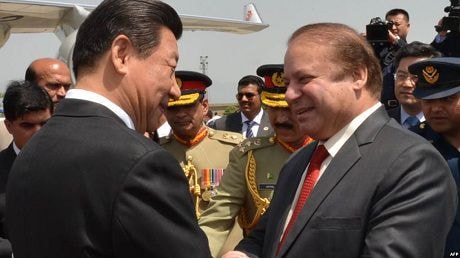Chinese President Visits Pakistan: Strengthening Allied Relations
(Baonghean) - On April 20, Chinese President Xi Jinping arrived in Islamabad to begin an official visit to Pakistan. This is the first visit by a Chinese President to Pakistan in the past 9 years. With the decision to upgrade bilateral relations to a comprehensive strategic partnership and China's investment plan worth 46 billion USD in this South Asian country, the alliance between China and Pakistan will be further strengthened.
 |
| Pakistani Prime Minister Nawaz Sharif (left) welcomes Chinese President Xi Jinping at the airport. Photo: AFP |
Shortly after arriving in Islamabad, Chinese President Xi Jinping met with Pakistani Prime Minister Nawaz Sharif, and the two sides decided to upgrade bilateral relations to a comprehensive strategic partnership. Chinese President Xi Jinping brought to Pakistan a plan to invest $46 billion in infrastructure and energy in the South Asian country over the next 15 years.
In return, Pakistan will help China penetrate the Indian Ocean through its deep-sea port of Gwadar on the Arabian Gulf as part of its plan to realize the Pakistan-China Economic Corridor. This is also a very important investment for Pakistan in the context of its stagnant economy. Pakistan hopes that this investment will end its persistent energy crisis and turn the country into a regional economic hub.
Just looking at the huge amount of money that China plans to invest in Pakistan shows how Beijing “keeps an eye” on Islamabad. The China-Pakistan Economic Corridor is the top concern during Chinese President Xi Jinping’s visit to Pakistan. Not only is China an important ally, it is also Pakistan’s largest trading partner with two-way trade exceeding $16 billion in 2014.
Therefore, in addition to political ties, economic ties will be a strong driving force for the relationship between China and Pakistan. Therefore, China wants to establish a China-Pakistan economic corridor including roads, railways and energy projects connecting the deep-water port of Gwadar in southwest Pakistan with the Xinjiang Uyghur Autonomous Region in northwest China. This is the “road to the sea” of one of the most difficult and rugged lands in China.
In addition, this project is also part of China's plan to revive the once-famous "Silk Road", and the China-Pakistan Economic Corridor project can even facilitate the maritime "Silk Road" that China pursues. In addition, many Chinese companies have invested in Pakistan, especially in infrastructure projects such as road construction, power plants and telecommunications.
With this investment from China, Pakistan will have the opportunity to boost its stagnant economy, while China can easily reach the Indian Ocean through the China-Pakistan Economic Corridor. According to analysts, for Pakistan, this economic cooperation with China is much more important than the "drip" aid of more than 1.5 billion USD annually that the US gives Pakistan.
However, in addition to strengthening economic cooperation, during Chinese President Xi Jinping's visit to Pakistan this time, the two countries also signed a number of cooperation projects on security and defense. For a long time, the closeness between Islamist militants in Pakistan and Afghanistan and Uyghur militants opposing Beijing in Xinjiang has always made the Chinese government "uneasy". Therefore, China relies on its good alliance with the Pakistani government and army to influence and persuade Islamist terrorists in Pakistan and Afghanistan not to attack Chinese targets or not to support the rise of Uyghur militants in the Xinjiang autonomous region. In addition, arms sales contracts between the two countries are increasingly making China the country that supplies the most weapons to Pakistan and dominate the US weapons in this South Asian market. The latest example is China's agreement to sell Pakistan eight diesel submarines worth about $4 billion, doubling Pakistan's current submarine fleet.
The upgrading of relations to a comprehensive strategic partnership once again shows that the alliance between China and Pakistan is increasingly strengthened in the context of mutual assistance that will bring great benefits to both sides.
Nguyen Cao Bien
| RELATED NEWS |
|---|
